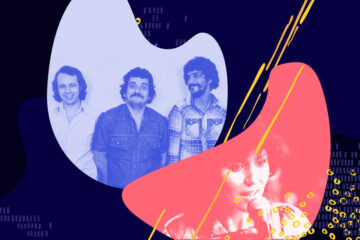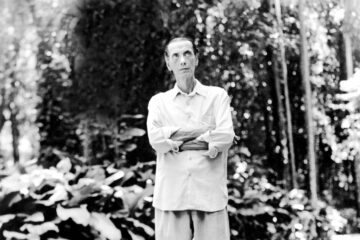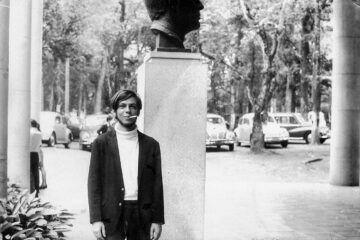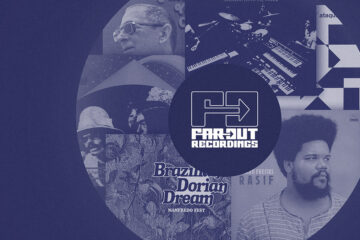When one reads about Tim Maia’s rise to become one of Brazil’s most successful singers, the comparison with the effect of a water bomb comes up regularly. The association is not far-fetched: firstly, the beach association is obvious with Brazil, secondly, Tim Maia is, let’s say, rather portly in stature and, thirdly, his music smashed into and flooded Brazil with soul. He was suddenly there, mixing up a country dominated by bossa nova and Música Popular Brasileira (MPB) with his unusual, stylish sound. But no matter how meteoric his rise may have been, Maia had been on the sidelines longer than he would have liked.
Tim Maia was born Sebastião Rodrigues Maia in 1942 in Tijuca, a working-class suburb of Rio. At the age of eight he was already singing Elvis and rock’n’roll at the kitchen table, and at 14 he had his first band, Os Tijucanos do Ritmo. Maia was one of the first in his neighbourhood who knew how to play a guitar, let alone own one, so he taught some of the other kids in the area. Among his pupils in the »Matoso Gang« were surprisingly many future musicians, for example the later MPB stars Roberto Carlos, Jorge Ben and Erasmo Esteves (later Erasmo Carlos) – a lucky coincidence, without which Maia would probably have ended up working at his parents’ delivery service or in prison.
Even then, music was one of Brazil’s biggest cultural exports. In German department store chains, civil servants bought samba imitations by James Last and Klaus Wunderlich, while bossa nova was to change the world at the end of the ’60s. The fascination with Brazilian music from the ’60s and ’70s, which has infected its fans worldwide since the ’90s at the latest, continues to this day. Countless compilations are dedicated to this era and prominent figures like Madlib, Babu, Cut Chemist and Gilles Peterson work hard to come up with new gems from this era on a constant basis.
There are many reasons why so much timeless, fantastic music was created in Brazil at the time which include good studios, a decentralised record industry and relative prosperity. Most of all, however, a cultural exchange has continuously shaped the music of this huge country, to which almost five million African slaves were abducted between 1501 and 1866. And last but not least: Tim Maia’s water bomb, which triggered a wave of new music.
In 1959, no one but himself would have thought that the singer would one day become a star. With 12 dollars in his pocket and surrounded by priests, 17-year-old Tim Maia arrives in New York. He doesn’t speak a word of English. But he had to get out of Brazil, it was time for a change of scenery. Shortly before, his second band, the Sputniks, had broken up after a quarrel, despite some minor successes. But more significantly, his father had died. Maia wants to leave, and eventually he manages to convince a local priest to take him with him on his trip to the US.
There, Maia couch surfs for four years at the homes of people he knows in Tarrytown, near New York. He keeps his head above water with odd jobs and petty crime, but above all Maia is exposed to jazz, R&B and soul thanks to a lively local scene. With a few friends, he founds the vocal group The Ideals, with whom he even recorded a collaborative single. For the recording, Maia is able to win over the renowned jazz drummer Milton Banana by ambushing him in his hotel (it would not be the last time in his career). Unfortunately, »New Love« remains unreleased: Before the band can look for a label, Tim is arrested in Florida in a stolen car while smoking pot. His bandmates are tired of posting bail for Maia (this is his fifth arrest). The singer spends six months in jail and is deported in 1963.
Tim Maia’s dream has been shattered
He comes back with nothing in his hands, telling acquaintances he has fled the draft because of the Vietnam War. He is back where he was – at the edge of the pool in Rio. But despite these setbacks, his belief in his own success remains unbroken. For he still has an ace in his swimming trunks: the neighbourhood boys from yesteryear are now established musicians who are turning Brazilian pop upside down. Even if establishing contact with them proves difficult, Maia is a master of hotel ambushes and thanks to a few lucky coincidences makes it back to his childhood friends. In the years to come, Roberto and Erasmo Carlos arrange for him to record two singles and even an appearance on the influential music show Jovem Guarda. But to no avail. The world wasn’t ready for Tim Maia yet.
Maia’s plunge into the pool, the end of his losing streak, was to become his third single. But not because it became a hit though. Producer Nelson Motta, father of Ed Motta and later Maia’s companion, hears the unreleased tracks »Primavera« and »Jurema« and shows them to the famous pop singer Elis Regina while the two are working in the studio on their new album, »…Em Pleno Verão«. She spontaneously decides to get the amiable singer on her album and the two record the duet »These Are The Songs«. One minute Maia was arguing with producers and having to ambush people in car parks, next he’s singing on the album of one of the most influential singers in the country.
Such a sudden turn for the better is hard to take. Maia may be unreliable, drug-addicted and unstable, but he is also prepared. His debut album, like the eleven others in his career, bears the name »Tim Maia« and stays at the top of the charts for more than half a year. He is certainly not the first Brazilian musician to be influenced by Black music from the USA. Yet, he doesn’t simply want to fuse funk and soul into Brazilian genres. He wants to make funk and soul; he breathes funk and soul and with him the whole country.
Over the next few years, he releases a successful album bearing his own name every year and not only revolutionises Brazilian music, but also becomes an influential symbol of the Brazilian civil rights movement as one of the country’s first pop stars of colour.
Notwithstanding the fact that he can be found sitting on dimly lit couches every day doing his »triathlon« of whiskey, joints and cocaine. Especially before performances. One of his favourite sayings is: »I don’t smoke, I don’t do coke and I don’t drink, but sometimes I lie a little«.
One day Tim roams the offices of the Philips record company with 200 sheets of LSD from London to »open the eyes« of everyone he meets with a tab – starting with the department that needs this form of »rescue« the most: the accounts department. On another, he buys himself absurdly shaped house doors in the form of a hawk or cows. Today, it is often said about him that he was free. Every day he did what he pleased. What he was really looking for was answers.
A fatal trip
In 1974, at the undeniable peak of his career, Tim Maia is found once again sitting on a couch with his friend and fellow musician Tiberio Gaspar, just as the mescaline kicks in. Gaspar is in the shower and the singer is looking for something to do. So he picks up a book from the coffee table that will change his life: »Universo em Desencanto« (»Universe in Disenchantment«) by Manoel Jacinto Coelho. The book provides an introduction to the world view of the »Rational Culture«, a religious community that would soon turn out to be an appropriating sect. According to Coelho’s confused theories, humanity originates from a distant planet and, in order to be saved by aliens, needs to experience spiritual compensation. For this to happen, everyone would first have to read or buy the book.
Actually known for his steadfastness, Tim Maia is immediately blown away. He dresses completely in white and nothing else and instructs both his family and his second family, as he sometimes calls his band, to do the same. All the instruments are painted white, everyone around him has to buy and read, »The Universe in Disenchantment«. He abruptly stops taking drugs and partying, starts eating healthily, and, as the legend has it, even abandons his rampant sex life. But more than anything else, all he wants to do is sing about the cult and the planet »Superior Racional«, where the aliens are supposed to take everyone.
At the time of his change of heart, Maia has almost finished recording his fifth album in one of Brazil’s best studios, only his vocals are still missing. So a completely sober, white-clad Tim Maia sits down in the studio and writes new lyrics to live up to his missionary responsibility. The tracks are now deadly serious sermons on funk beats, stuff that Maia’s young clientele won’t be able to relate to too much. When RCA refuses to release the album, Maia unceremoniously founds a label and brings the album out on his own. Distribution mainly takes place through the band members, who sell the albums to acquaintances.
The fact that »Racional« Vol. 1 and 2 have always had a special attraction for fans of Tim Maia’s discography is doubtlessly due to the wacky background story and not least to the fact that the two albums are incredibly rare compared to Maia’s other blockbusters. But above all, tracks like »Imunização Racional (Que Beleza)«, »Rational Culture« or Bom Senseo are simply among the best Tim Maia ever created in his career. His healthy lifestyle is reflected in his voice, which sounds better than ever. In just under a year he releases two albums for the cult, and even has material for a third. And the sect is more popular than ever. But after an altercation with its leader, Coelho, Maia turns his back on the cult as quickly as he turned to it.
Burnt out, disillusioned and broke
Provided you can call his wacky daily routine of spontaneous ideas, music, partying and loads of intoxicants a reality. Then he simply releases a few more brilliant »Tim Maia« albums. In the late ‘70s, he successfully jumps on the disco bandwagon and keeps going. Through regular hits, talk show appearances and concerts that he skips rather frequently, Maia remains an icon for decades in the country he so desperately wanted to leave behind when he was seventeen.
In 1998, he is exactly where he feels most at home: on stage at a concert in Niterói, a rich neighbouring city of Rio with half a million inhabitants. Suddenly, Tim Maia falls motionless to the ground. A week later, he dies in hospital at the age of just 55. The heavily overweight soul colossus is finally reeled in by decades of partying, stress and »triathlons«.
The only dream that would remain out of reach for Maia in his fulfilled, intense life is international fame. It is a little macabre that the reissue label Luaka Bop promotes the Tim Maia compilation »Nobody Can Live Forever« as the posthumous fulfilment of this dream. However, it is true that Tim Maia has received the recognition outside Brazil that he deserves as one of the most exciting soul singers ever in recent years. It is also true that the wave Maia created when he jumped still has to finally subside.









